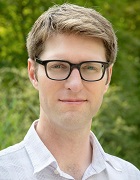
Prof. Dr. Karl Duderstadt
Academic Career and Research Areas
The faithful duplication and transmission of genetic and epigenetic information is the most vital cellular function for the preservation and proliferation of life. In cells, this process is conducted by large macromolecular complexes, known as replisomes, that coordinate enzymatic events during chromosome duplication. Through the development of single-molecule imaging approaches, Prof. Duderstadt (b. 1982) investigates the dynamic events that ensure the coordination of chromosome duplication and studies the consequences of replisome encounters with obstacles on chromosomes.
Prof. Duderstadt studied Physics at Oberlin College (USA) from 2001 to 2004 and received his doctorate in Biophysics from UC Berkeley (USA) in 2011. He was a Human Frontier Science Program postdoctoral fellow at the University of Groningen (The Netherlands) from 2011 to 2015. He relocated to Munich in 2016 to lead the Max Planck Research Group “Structure and Dynamics of Molecule Machines” at the MPI of Biochemistry in Martinsried. Since 2016, he has been a Tenure Track Professor for Experimental Biophysics at TUM through the MaxPlanck@TUM program.
Awards
- European Research Council (ERC) Starting Grant (2019-)
- Human Frontier Science Program postdoctoral fellow (2012-2015)
Key Publications (all publications)
Hill FR, van Oijen AM, Duderstadt KE: "Detection of kinetic change points in piece-wise linear single molecule motion". The Journal of Chemical Physics. 2018; 148(12): 123317.
AbstractScherr MJ, Safaric B, Duderstadt KE: "Noise in the Machine: Alternative Pathway Sampling is the Rule During DNA Replication". BioEssays. 2018; 40(2): 1700159.
AbstractDuderstadt KE, Geertsema HJ, Stratmann SA, Punter CM, Kulczyk AW, Richardson CC, van Oijen AM: "Simultaneous Real-Time Imaging of Leading and Lagging Strand Synthesis Reveals the Coordination Dynamics of Single Replisomes". Molecular Cell. 2016; 64(6): 1035-1047.
AbstractDuderstadt KE, Berger JM: "A structural framework for replication origin opening by AAA+ initiation factors". Current Opinion in Structural Biology. 2013; 23(1): 144–153.
AbstractDuderstadt KE, Chuang K, Berger JM: "DNA stretching by bacterial initiators promotes replication origin opening". Nature. 2011; 478(7368): 209-213.
AbstractIf you wish your profile to be changed or updated please contact Franz Langer.